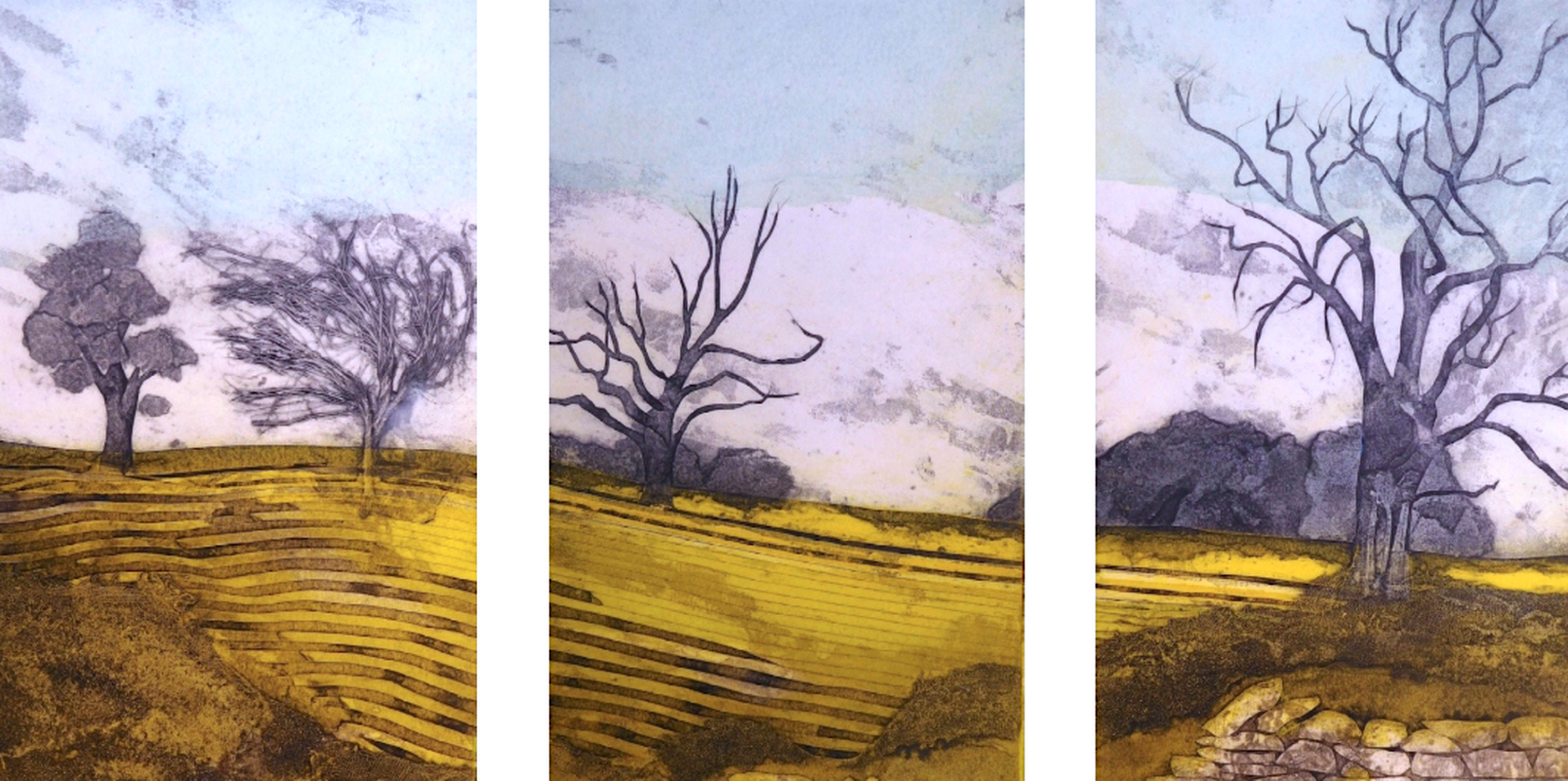
SARAH ROSS-THOMPSON AND THE ART OF COLLAGRAPHED PRINTS
I interviewed artist Sarah Ross-Thompson whose exceptional Collagraphed prints use fabrics, lichen, porridge and string to create images of the dramatic Scottish Highlands where she
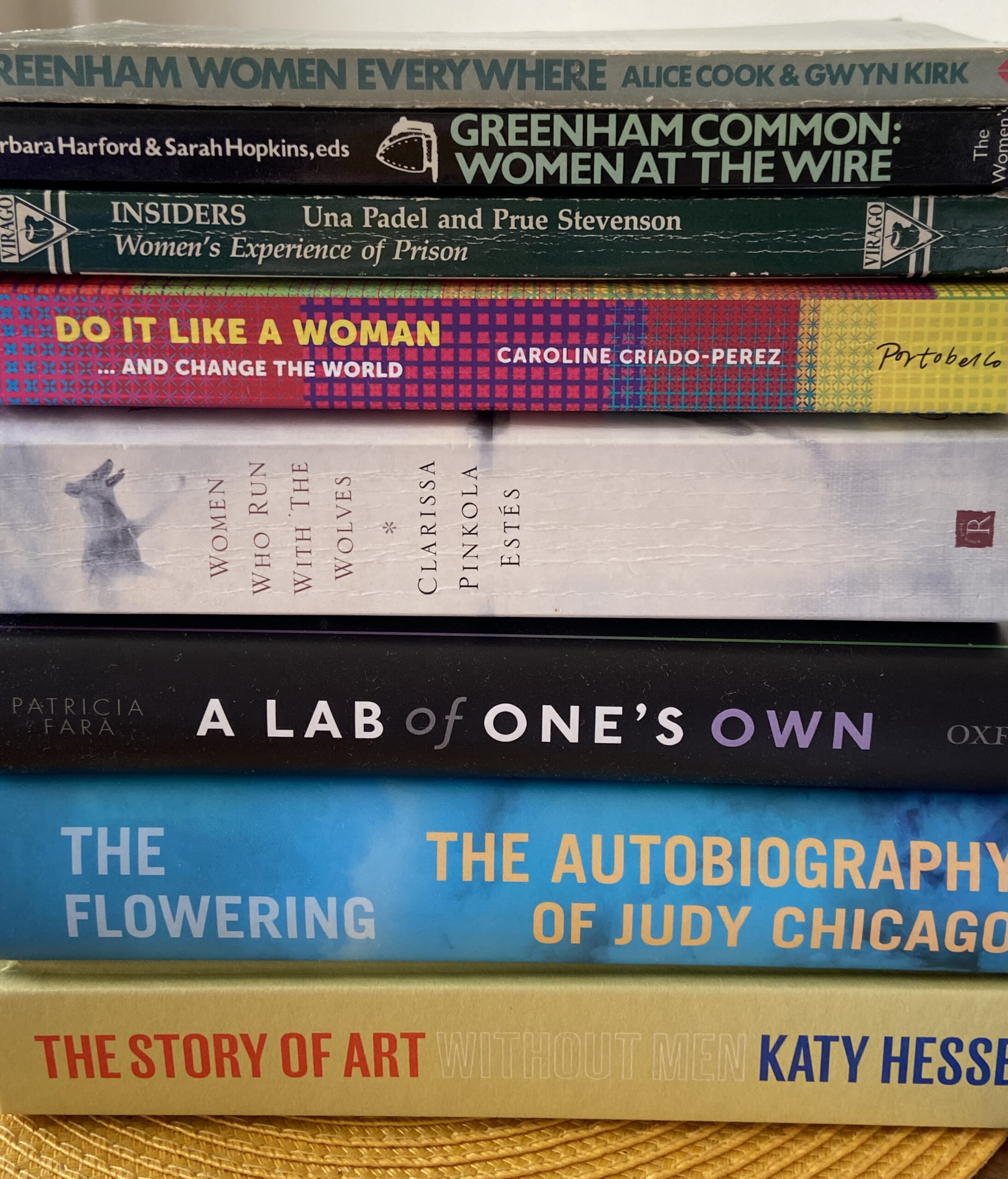
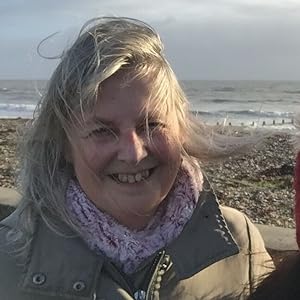
I interviewed Quaker and author Sue Curd about her years as an Open University tutor, her creative writing studies and her innovative debut novel, ‘Alice Paints Greenham.’ Sue talks about how she researched her book, what she learned from writing it and her concerns for the planet.
Leslie: Tell us about ‘Alice Paints Greenham’ – assuming this has some of you in it, what are the key parts based on your experience and what parts are your own life but changed (and why those changes)? What were the most important additions to the book as a result of your research?
Sue: I think you discover a lot about yourself when you write and at first I wasn’t aware that anything in’ Alice Paints Greenham’ was related to me. Some way into writing Alice’s story I remembered seeing a postcard of Anselm Kiefer’s called Herzeleider. I’d been in a Quaker meeting, when I came across it, using it to centre down for Quaker worship and to me the picture seemed to be a woman holding a palette of paints and the palette was also shaped a bit like an embryo. I had Alice paint her own version of this same painting.
It spoke to me of the dilemma of being a mother (my son is grown-up now) and being able to also find time to be creative. I had been reading so many feminist books and was wondering how I had missed out on knowing about so many significant women – painters, political women, aviators, astronomers, all kinds of women. They somehow weren’t prominent in the history books (not in my secondary modern school in the 1960s and early 70s).
So I started to write about a woman artist – Alice – and her frustration at not being as successful as her artist husband. Less opportunities to exhibit, much lower sale prices for her paintings. As I set the scene, I realised there were so many stories of women not being able to succeed and that there was nothing particularly interesting enough about Alice and her struggle. I’d set the story in the early 80s and began to think about what was happening during those years and realised that Greenham Peace Camp had been established then. At that time I was living in Germany, then back in London, fell in love and weirdly ended up moving, in 1984, to Swindon, the next major town to Newbury along the M4. Why I didn’t go to Greenham? I don’t know. I wish I had.
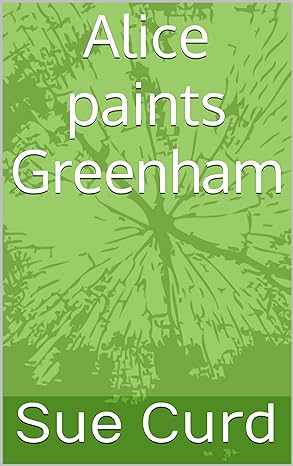
Leslie: How did you research ‘Alice Paints Greenham’, and what were the surprises?
Sue: My research on the Greenham aspects coincided with the 40th anniversary of Greenham Peace Camp having started. There were masses of interviews of Greenham women published on the internet.
I went to the 40th anniversary celebration at Greenham Common (now a nature reserve pretty much). It was great to hear their stories first hand and to ask them about the difference that Newbury Quakers had made. In my everyday life, more and more Greenham women came into my orbit, fellow tutors at the Open University, Quaker friends, my then next-door neighbour (briefly) who visited the camp as a midwife. What was evident was that there wasn’t a ‘typical’ Greenham woman – the early women were steeped in understanding about nuclear war and became engaged in political ways (home and abroad). Gradually more women came for both a concern for peace and additional reasons to do with difficult lives (domestic abuse, public attitudes to same-sex relationships for example). Some were mothers and grandmothers, some were religious and some not, working class and middle class, there were those who supported the main actions frequently, those that brought food and others that helped protect those camping at night against physical abuse.
It surprised me how inaccurately the media covered their story – rarely focussing on the peril of nuclear war, instead in criticising their lifestyle (and that’s putting it politely).
Leslie: Where did the characters come from in ‘Alice Paints Greenham’ and how did they change during the writing process?
Sue: The novel alternates between Alice’s life as a struggling artist (and wife of an artist) and chapters about the Greenham women told in first person plural. The Greenham women chapters show the many different facets of life at the camp. Alice alongside that becomes fast friends with a young undergraduate artist (Kate), a scientist (Bridie) who is a camp-cook and Cassie whose only home is Greenham. As Alice’s ‘normal’ life disintegrates her Greenham friends become her family and her relationship with Kate intensifies. There’s one character from her past, Jackie, who takes a more traditional role as a contrast to Alice. I found myself pulling on actual incidents to build the backstory, one in particular I’d completely forgotten about going to a supposed ‘party’ in Putney and there were guns. You never know when weird incidents from your past will help inject some spice into a story!!
Leslie: What were the key things about yourself and writing that you learned from being a member of Ventnor Scribblers? In what ways did your MA in Creative Studies add to or change those understandings?
Sue: In my 50s I found more time to learn how to write. I took some undergraduate OU modules and alongside that joined a group called Ventnor Scribblers on the Isle of Wight. Over the years having fellow writers provide detailed feedback has absolutely helped me to learn the craft of writing and more importantly editing. I had help from a latecomer to the Ventnor group when we were meeting online during the pandemic and she gave me the idea of writing the Greenham chapters in first person plural, something I wouldn’t have come up with myself. I also became a member of SO:WRITE WOMEN, facilitated in the first year by Joanna Barnard and she provided a professional developmental report for me.
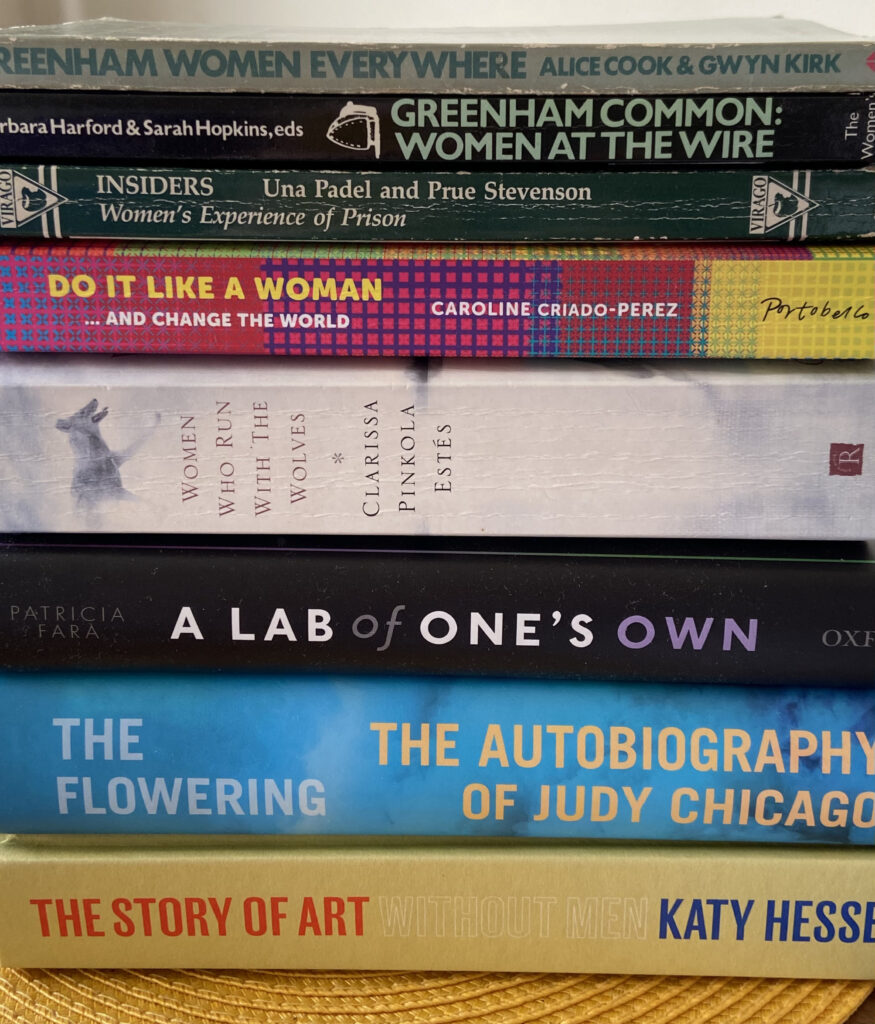
Before the pandemic I’d started a part-time MA in Creative Writing at Chichester Uni. I completed two years, passing all the modules but gave up putting in a dissertation – 3 chapters of my book required – I couldn’t decide on which 3 chapters and it was lockdown by this time. Whilst I’d spent some twenty years tutoring distance learning style, I was pretty fed up of online working and didn’t relish going back to that as a student during lockdown.
I’m so glad to have studied the theory and practice of writing at Master level with such a great group of students. I’ve learned to love the re-drafting/editing phase of producing a book. It was also superb to receive critique from peer group and tutors on a frequent basis. I miss that.
Leslie: What’s the story of you becoming an Open University tutor in business, entrepreneurship, innovation and environment? In what ways did the OU skills play a part in becoming an author?
Sue: I’d worked in business all my life firstly in administration and also as a secretary. At the same time I was working towards my degree (with the OU) studying mostly environmental science. I fell into working as an OU tutor when they launched their first module teaching computing/internet history and web skills. The demand for the module far exceeded the university’s expectation (it was 1999) and they needed to look further afield and recruit some practitioners. Whilst I was working full-time as an innovation project manager, I tutored the new module and soon began studying for an MBA with the OU. I hardly know how I managed to juggle all of that whilst running a household and having a marriage and a son to care for.
Anyone will tell you that being an OU student, usually working at the same time, means you acquire superb time management skills and a great deal of resilience. This experience definitely helped me to keep going when I might of have given up with writing a novel.
Leslie: How have The Isle of Wight and Sussex, as well as Quakerism, affected and changed your lifetime views and feelings? What are your deepest passions (and how have they changed)?
Sue: I moved to West Sussex in 2019 to be nearer to Chichester University where I was studying, also testing out if I could adapt to mainland life. The OU work is immensely flexible enabling me to carry on tutoring wherever I lived. My Mum died right at the start of the pandemic and so the main reason I might have returned to the Island disappeared. So now I’m in Sussex which I love.
Quakerism presents me with a challenge to continually reflect, and in the beginning it meant the boundaries between faith and social concerns didn’t exist anymore. I spent some time exploring Quakerism before committing. I took many courses at the Woodbrooke Quaker Study Centre (now an online and ‘on the road’ study resource). Often writing and Quakerism fed each other. I volunteered for all kinds of Quaker projects – helping with the Quaker Meeting House box office where Edinburgh Fringe events were being held, also as a volunteer at a Christmas Shelter project in London. I made it my business to meet Quakers beyond my local meeting and found a rich diversity of faith and action.
My concern for climate change is rooted in both my academic studies and in Quakerism. I’m now involved in central committee work and have started to understand some of the thinking, action and spirituality of other Quakers concerned about climate collapse. I’m not an activist but I am a writer, maybe that’s my part to play. In Quaker circles, there’s been a shift towards thinking about climate justice and tied up in that is working for peace. There can be no justice unless there is peace, alongside truth of course. So for the decade or so I have left, that’s the space I’m in – what precisely I can do I have no idea but I’m open to taking the next step and the next step and so on.
Next week I interview Stephen Wollaston, aka Santoshan, a OneSpirit Interfaith Foundation minister
ABOUT LESLIE TATE’S BOOKS:

I interviewed artist Sarah Ross-Thompson whose exceptional Collagraphed prints use fabrics, lichen, porridge and string to create images of the dramatic Scottish Highlands where she

Part 2 of my interview with Mark Statman looks closely at Mark’s Latin American poetic influences, his life in Mexico and ends with an extract

I interviewed international poet and translator Mark Statman about Volverse/Volver, his 14th published collection. Mark, who has won national arts awards, is Emeritus Professor of Literary

I interviewed Lisa Dart, finalist in the Grolier, Aesthetica and Troubadour Poetry Prizes and author of The Linguistics of Light (poems, Salt, 2008), Fathom (prose

I interviewed writer Julia Lee Barclay-Morton about her experience of autism. Julia began as an experimental dramatist in New York, moving to the UK to
| Cookie | Duration | Description |
|---|---|---|
| cookielawinfo-checkbox-analytics | 11 months | This cookie is set by GDPR Cookie Consent plugin. The cookie is used to store the user consent for the cookies in the category "Analytics". |
| cookielawinfo-checkbox-functional | 11 months | The cookie is set by GDPR cookie consent to record the user consent for the cookies in the category "Functional". |
| cookielawinfo-checkbox-necessary | 11 months | This cookie is set by GDPR Cookie Consent plugin. The cookies is used to store the user consent for the cookies in the category "Necessary". |
| cookielawinfo-checkbox-others | 11 months | This cookie is set by GDPR Cookie Consent plugin. The cookie is used to store the user consent for the cookies in the category "Other. |
| cookielawinfo-checkbox-performance | 11 months | This cookie is set by GDPR Cookie Consent plugin. The cookie is used to store the user consent for the cookies in the category "Performance". |
| viewed_cookie_policy | 11 months | The cookie is set by the GDPR Cookie Consent plugin and is used to store whether or not user has consented to the use of cookies. It does not store any personal data. |